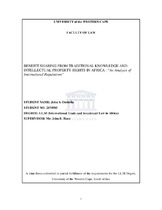| dc.contributor.advisor | Hunt, John E | |
| dc.contributor.author | Ombella, John S. | |
| dc.contributor.other | | |
| dc.contributor.other | Faculty of Law | |
| dc.date.accessioned | 2013-09-27T09:13:02Z | |
| dc.date.available | 2008/06/19 11:05 | |
| dc.date.available | 2008/06/19 | |
| dc.date.available | 2013-09-27T09:13:02Z | |
| dc.date.issued | 2007 | |
| dc.identifier.uri | http://hdl.handle.net/11394/2168 | |
| dc.description | Magister Legum - LLM | en_US |
| dc.description.abstract | This thesis was written in the contemplation of the idea that, it is only through protection of the traditional knowledge in African local societies where these societies can rip the benefit of its commercialization and non-commercialization. It was thus centered on the emphasis that, while the African countries are still insisting on the need to have amendments done to the TRIPS Agreement, they should also establish regulations in their domestic laws to protect traditional knowledge from being pirated. This emphasis was mainly raised at this time due to the wide spread of bio-piracy in African local societies by the Western Multinational Pharmaceutical Corporations. | en_US |
| dc.language.iso | en | en_US |
| dc.publisher | University of the Western Cape | en_US |
| dc.subject | Intellectual property (International law) | en_US |
| dc.subject | Cultural property | en_US |
| dc.subject | Protection (International law) | en_US |
| dc.subject | Folklore | en_US |
| dc.subject | Law and legislation | en_US |
| dc.subject | Indigenous peoples | en_US |
| dc.subject | Africa | en_US |
| dc.subject | Legal status | en_US |
| dc.subject | law | en_US |
| dc.title | Benefit sharing from traditional knowledge and intellectual property rights in Africa: "an analysis of international regulations" | en_US |
| dc.type | Thesis | en_US |
| dc.rights.holder | University of the Western Cape | en_US |
| dc.description.country | South Africa | |

